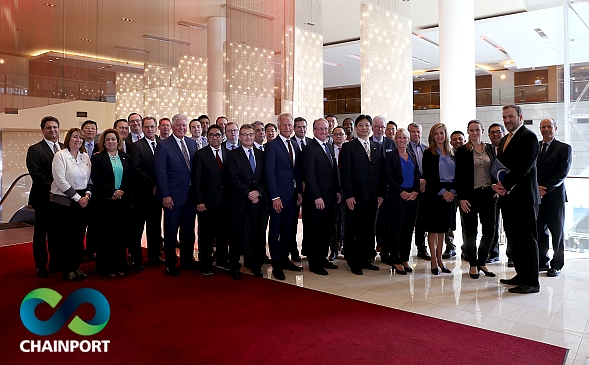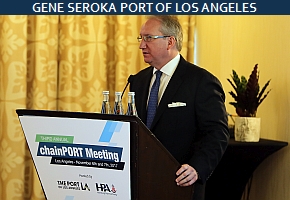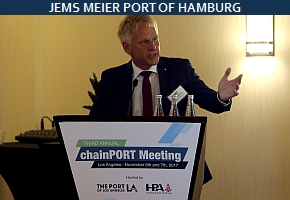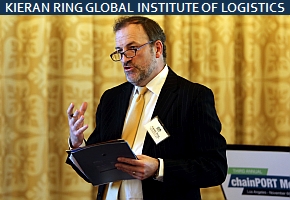LOS ANGELES NOVEMBER 2017
SUPPLY CHAIN DIGITIZATION OF OCEAN CARGO GATEWAYS EXAMINED BY CHAINPORT AT THIRD AGM
The partnership is driven by several key working groups reporting to a steering committee comprising the CEO’s and Presidents from the member ports. The working groups focus on a range of subjects including smart IT solutions, shaping digital change in port authorities (people & processes).
The chainPORT initiative is led by the Ports of Los Angeles and Hamburg Port Authority in Germany, in collaboration with the Global Institute of Logistics. Other ports participating in the third annual meeting are Shanghai, Antwerp, Barcelona, Montreal, Felixstowe, Indonesia, and Shenzhen.

CLICK HERE FOR CAPTION
 “Working together to explore best practices and innovation, as well as leading-edge technology to improve port operations is more important than ever in a global environment,” said Port of Los Angeles Executive Director Gene Seroka. “As a port, we need to continue to evolve and adapt to remain both competitive and relevant.”
“Working together to explore best practices and innovation, as well as leading-edge technology to improve port operations is more important than ever in a global environment,” said Port of Los Angeles Executive Director Gene Seroka. “As a port, we need to continue to evolve and adapt to remain both competitive and relevant.”
Seroka kicked off the two-day meeting with a presentation about Port of Los Angeles’ supply chain optimization pilot project in partnership with GE Transportation. Together they are developing a digital portal that provides real-time shipping information for cargo owners and supply chain providers to more effectively track and plan for movement of their cargo from ocean transit to final destination. Based on the initial pilot results, the port anticipates efficiency gains of between eight and 12 percent as the enhanced solution is rolled out.
 “Port operations are becoming more and more complex, and we strongly believe port authorities working together around the globe can add significant extra value to the global supply chain,” said Jens Meier, CEO of the Hamburg Port Authority. “Collaboration in a global network of ports and digitization is the way of the future.”
“Port operations are becoming more and more complex, and we strongly believe port authorities working together around the globe can add significant extra value to the global supply chain,” said Jens Meier, CEO of the Hamburg Port Authority. “Collaboration in a global network of ports and digitization is the way of the future.”
Meier focused his presentation on a vision of the digitalized port of the future and what needs to be done to get there. Presentations were then given by leads of each of chainPORT’s five working groups: Smart IT solutions; Implications & Solutions for Ultra Large Container Vessels; Digital Change within Port Authorities; Project chainLOG; and the Port Academy.
 “Historically ports were measured on their ability to accommodate ships and other modes of transport effectively and efficiently,” said Kieran Ring, CEO of the Global Institute of Logistics, which was instrumental in getting the chainPORT alliance off the ground. “However, increased international trade and the global economic environment have given rise to a new breed of customers who demand optimum flexibility, efficiency, and transparency in their dealings with ports.”
“Historically ports were measured on their ability to accommodate ships and other modes of transport effectively and efficiently,” said Kieran Ring, CEO of the Global Institute of Logistics, which was instrumental in getting the chainPORT alliance off the ground. “However, increased international trade and the global economic environment have given rise to a new breed of customers who demand optimum flexibility, efficiency, and transparency in their dealings with ports.”
One keynote address was given by Nick Vyas, director of the Center for Global Supply Chain Management at the University of Southern California’s Marshall School of Business.
“My focus was on supply chain optimization and digitization,” he says. “These are issues we will revisit when USC hosts our 6th Annual Global Supply Chain Excellence Summit next August.”
Jay Samit, Independent Vice Chairman of Deloitte Digital, was the other keynote speaker. He addressed the challenges ports face, driving their needs for creative solutions.
Visiting port representatives also toured the Port of Los Angeles, and paid a visit to Virgin Hyperloop One, the commercialized land-transportation concept for goods and passenger movement currently being developed in Los Angeles.
About chainPORT
chainPORT has been developed in response to the changing economic and ecological landscape facing the maritime sector, including economic shocks impacting trade volumes, challenges posed by mega vessels, the emergence of IT megatrends and more stringent environmental standards.
Port authorities in their position as ‘trusted and honest brokers’ are being increasingly relied upon by cargo owners, shipping lines, and modal operators to perform the function of coordinators and communicators in support of supply chain optimization. This development is being driven by cargo owner’s interests and expectations for door-to-door rather than traditional port-to-port solutions.
Locally, port authorities are responding to this demand by leveraging their position to develop port community systems, which gather, collate and share data from the various stakeholder groups within their ports to aid better coordination, communication, and control around cargo flow. Data is shared with appropriate parties on a need to know basis (without commercial infringement) in the best interest of the local supply chain.
chainPORT partners are committed to leveraging the latest developments in technology to realize their vision of a smart, interconnected and digital world port system. The initiative brings together like-minded port professionals to share with, learn from and benchmark with each other their respective experiences in their newfound role of supply chain optimizers.

